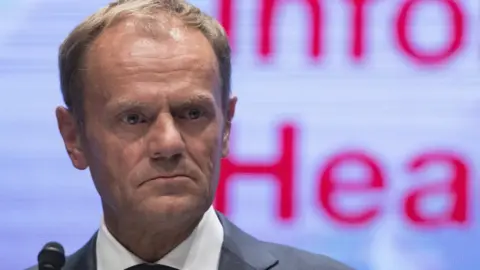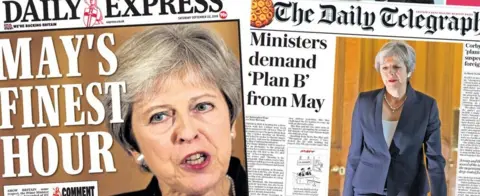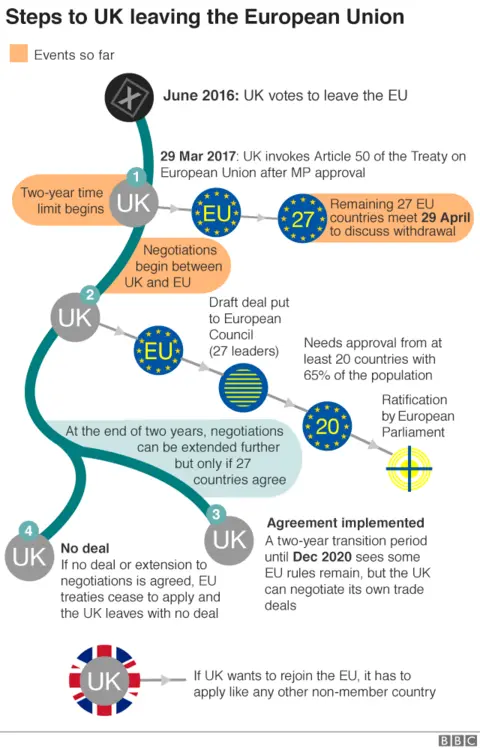Brexit compromise still possible, Donald Tusk says
 EPA
EPAEuropean Council President Donald Tusk has said a compromise with the UK over Brexit is "still possible", after Theresa May warned she was prepared to walk away from talks.
In a statement, Mr Tusk said he was a "true admirer" of the PM.
But he defended the EU's approach and said it was in fact Mrs May who had been "tough" and "uncompromising".
Mrs May on Friday demanded more respect from Brussels after EU leaders rejected a major part of her Brexit plan.
She had tried to sell her blueprint, which was agreed by ministers at Chequers, to EU countries at a summit in Salzburg, Austria, this week.
But the EU said the new economic partnership she had put forward "will not work" and risked "undermining the single market".
'Close friend'
The UK is due to leave the EU on 29 March 2019 - but the two sides are trying to reach a deal by November so it can be ratified in time.
Mr Tusk issued a statement on Friday evening, hours after Mrs May delivered her own speech in Downing Street in which she said the EU's rejection of her plan without offering an alternative was "unacceptable".
Mr Tusk said EU leaders at the summit had treated her proposals with "all seriousness" and said they were a "step in the right direction".
Britain had known about the EU's reservations over the Chequers plan for weeks, he added.
Mr Tusk said: "While understanding the logic of the negotiations, I remain convinced that a compromise, good for all, is still possible.
"I say these words as a close friend of the UK and a true admirer of PM May."

'Defiant' May: How the papers reacted

Mrs May's statement dominates many of Saturday's front pages.
The Express calls her speech her "finest hour" and says she was right to demand respect from the EU and the Daily Mail says Mrs May "confronted the arrogance of the EU elite with unyielding, level-headed reason" and describes the EU's behaviour in Salzburg as "shabby".
The Sun describes it as Mrs May's "Brexit fightback" while the i draws a comparison to Margaret Thatcher with a headline that reads: "May tells EU: I'm not for turning".
But the Daily Telegraph says the prime minister is facing a showdown with her cabinet next week when ministers will call for a "Plan B" alternative to the Chequers proposals.

'Rough ride'
Italian MEP Roberto Gualtieri, who sits on the European Parliament's Brexit Steering Group, also expressed optimism that a solution will be reached.
He told BBC Newsnight: "I think that no deal is not an option. We are sure that the rationality will prevail."
In her televised statement on Friday, Mrs May said talks had reached an "impasse" and could only be unblocked with "serious engagement" from the EU side.
"Throughout this process, I have treated the EU with nothing but respect," she said. "The UK expects the same, a good relationship at the end of this process depends on it.
"At this late stage in the negotiations, it is not acceptable to simply reject the other side's proposals without a detailed explanation and counter proposals."
The pound's fall against the dollar and the euro deepened following Mrs May's statement.
Some Brexiteer MPs praised her for her comments. Jacob Rees-Mogg welcomed the "strong and forthright" speech but said she should abandon her Chequers plan and come forward with a Canada-style free trade agreement.
Conservative MP Andrew Bridgen - who previously called for a no-confidence vote on Mrs May - said she needed to "chuck" the Chequers plan.
"I think it could be a very, very rough ride for the prime minister when she finally realises how unpopular her Chequers proposals are, not only within the EU, but within the membership of the Conservative Party out in the constituencies," Mr Bridgen told BBC Newsnight. "It' s a grim time really.
'Stand firm'
In her speech on Friday, the PM said both sides were still "a long way apart" on two big issues: the post-Brexit economic relationship between the UK and EU, and the "backstop" for the Irish border, if there is a delay in implementing that relationship.
Both the UK and the EU want to avoid a hard border - physical infrastructure like cameras or guard posts - between Northern Ireland and the Irish Republic but cannot agree on how.
The two options being offered by the EU for the long-term relationship - for the UK to stay in the European Economic Area and customs union or a basic free trade agreement - were not acceptable, Mrs May said.
Mrs May says her plan for the UK and EU to share a "common rulebook" for goods, but not services, is the only credible way to avoid a hard border.
Arlene Foster, leader of Northern Ireland's DUP, who Mrs May relies on for a Commons majority in key votes, said the prime minister was "right to stand firm in the face of disrespectful, intransigent and disgraceful behaviour by the European Union".
Labour leader Jeremy Corbyn said the prime minister's negotiating strategy "has been a disaster" and said "political games from both the EU and our government need to end" to avoid a no-deal scenario.
Labour wants to see the UK join a customs union with the EU after Brexit, but remain outside of the single market.


